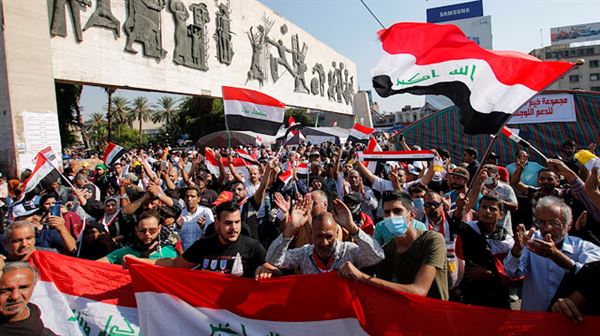The latest wave of anti-government protests in Iraq is considered the gravest challenge to the cabinet of Prime Minister Adel Abdul-Mahdi since it cam
The latest wave of anti-government protests in Iraq is considered the gravest challenge to the cabinet of Prime Minister Adel Abdul-Mahdi since it came to power a year ago.
The protests, which began Oct. 25, were staged against corruption, unemployment and lack of basic services, problems that Abdul-Mahdi attempted to address. Yet, the most challenging were the political demands calling for the government and president to step down and the dissolution of parliament.
Iraqi state institutions are beset by the control of political parties and armed factions on public funds, while the executive authority is plagued by corruption.
Such corruption was the main driver of the demonstrations, an early demand of Iraqis which reached an unsustainable level, according to international transparency organizations.
Any change in the government is controlled by the main political blocs in parliament and is directed under their policies. There are also external factors and foreign interference, especially from the U.S. and Iran.
This was reflected in President Barham Salih’s statements on Thursday, in which he said “any government formation is subject to agreement between the Hashd al-Shaabi and Sairoon blocs” – the two largest blocs in Iraqi parliament.
Despite promises by Abdul-Mahdi to calm the situation, he admitted that he does not have a magic wand to solve problems his cabinet inherited from previous governments since 2003.
But these promises of reforms were not enough to convince the protesters, as the solution requires fundamental political and economic changes.
In principle, Abdul-Mahdi does not refuse to resign. He announced that he would be willing to step down if an agreement was reached between Hadi al-Amiri, who controls the second-largest bloc in parliament, and Muqtada al-Sadr, who leads the parliament’s largest bloc.
Despite calls by al-Sadr for the government to resign, it seems that Abdul-Mahdi will not step down since he enjoys the political support of his parliamentary bloc and of Iraq’s influential Hashd al-Shaabi militia.
Abdul-Mahdi also relies on the unlimited support from parties and blocs that are close to Iran, which have a major influence in Iraq’s political, security and financial institutions.
What makes it difficult to reach an agreement between the government and protesters is that there is no clear leadership of the demonstrators, which makes it hard to bring the protests under control, although al-Sadr has hinted on several occasions that he endorses the demands of the protesters, especially since many of the protests have taken place in areas where he enjoys popularity.
The Iraqi premier also enjoys the support of the main Kurdish parties, which – although recognizing the right to peaceful assembly and expression of opinion – may not find a better partner in government than Abdul-Mahdi since he understands the outstanding issues between Baghdad and Erbil.
Iraq’s Sunnis, meanwhile, are taking the “wait-and-see” position regarding the protests and ongoing talks inside the government and parliament, without taking a clear position regarding Abdul-Mahdi’s resignation.
All in all, it seems unlikely that Abdul-Mahdi will resign as he is also betting on the time factor to address the security challenge, believing the protests could diminish over time.
*Ahmed Asmar contributed to this report from Ankara
